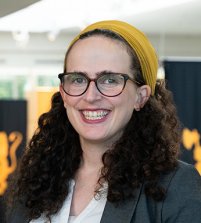
The Alabama IVF Decision is About Care Work
We must learn to see infertility treatment and queer family building as essential moments of care, and not as unintended casualties of a bigger debate on abortion.
If you live through any part of the process of needing to make a frozen embryo which you then hope will eventually become a child, you know that the gap between these two things is immense. You know in your bones what it takes to traverse it: it takes so many injections that the sharps containers that you never figured out how to safely dispose of take up the top shelf of your closet; it takes the bruising on your hips where the needles go in each day; it takes the pit of your stomach dropping when you have your blood drawn to see whether the embryo implanted; it takes the way the phone ring still feels triggering from the days you waited for calls with results. If you make it that far, it takes the days of fear of losing the tiny-but-also-unimaginable amount of progress you've made, and it takes the long process of trying to find the willingness to try again when that progress, and the hope that accompanied it, is lost. It takes the white of your knuckles as they grip the side of the bed during the extra scans you have because of the risks of IVF pregnancies. It takes the fear you feel when the ultrasound tech is silent for minute after minute as they take careful scans during a fetal echo. It takes the pain and risk of having to induce labor because placental quality in IVF pregnancies declines after forty weeks and the obstetrician won't let you wait another day. And it takes moving through the liminal, strange, powerful moment of birth to turn this precious little ball of cells into a person, into your child.
The Alabama Supreme Court’s recent ruling, and the ways that the Republican party’s position on abortion affects fertility care more generally, has been described as a symbol of America’s decline into theocracy, as an indication of the undemocratic nature of the judiciary, or as a sign of the Republican party’s growing grip on state politics. But the Republican party’s willingness to endanger IVF by claiming that frozen embryos are children is also indicative of something much more basic: the consistent erasure of the very real work, indeed labor, that women and queer people, along with their families and doctors, are doing to turn those embryos into our children.
This erasure is anything but accidental. Feminist philosophers have long recognized that “care work”—the myriad forms of labor which tend to the very young and the very old, and to those in between needing substantial day-to-day care to thrive—is economically, socially, and intellectually undervalued, in part because this form of labor is usually done by women and other people from marginalized groups.
Care ethicists also pointed to a deeper conceptual problem that obscured the moral significance of “care work”: despite the fact that everyone needs care, care is rarely economically rewarded, and even more rarely treated as a resource for moral thinking. Instead, traditional moral philosophy tends to focus on an isolated subject, a “person” who demands moral consideration precisely because of the way that it can be separated from those around it. It is because we can identify the moral subject as a thinker distinct from other thinkers (Kant), or a possessor of virtues distinct from other possessors of virtues (Aristotle), or a potential user of human capacities distinct from other users of human capacities (Nussbaum), that we have to treat human beings in particular ways.
In a way, the Alabama Supreme Court decision’s move to treat embryos as children is just another iteration of this process. If we think an embryo has moral significance, we have to be able to identify it as a human unit, as a “person,” separate from other people. And, somewhat paradoxically, to do that we have to be able to “unsee” the work of the people to whom those embryos are most deeply tied. We have to unsee the pain, the physical labor, and the emotional work that could make an embryo a child. In an effort to find moral significance in one place, we have to ignore it in another.
Recent political reporting has styled the Alabama Supreme Court’s decision as an unfortunate “side effect” of the American Right’s position on abortion—something the GOP political establishment didn’t see and that will cause electoral problems down the road. The care ethicists help us see that this is more than an unpredictable twist in the electoral horse race: it is no accident that this decision forgets or ignores the care work done by women and queer people—it is entirely consistent with a politics that, over and over again, fails to treat care, especially care provided by women and queer people as economically and morally significant.
To remedy this problem, the care ethicists would have us turn to the mother-baby dyad as the paradigmatic example of what the care we are missing looks like. Recent scholarship in religious studies—especially in my own subfield of Jewish studies—has taken up this agenda, with a “maternal turn” which has worked productively to remedy both the scholarly and political marginalization of maternal care. But, by focusing on the mother-child dyad, care ethics (and the religious studies scholarship that uses its core paradigms) often writes those struggling to conceive largely out of the story. This is in part because of care ethics’ relentless focus on the embodied “concrete” physical connection created by care. Just as contemporary political life–and the philosophical terms often used to explain it—so often turns its gaze away from essential, but gendered, forms of care, even feminist writers often avert their eyes away from infertility.
IVF certainly doesn’t look like a glowing, feminine-presenting mother gazing longingly at a happily cooing baby, and it rarely looks like the kind of “responsiveness” or connection that care ethicists treat as central features of care. It looks like isolation; it looks like shame; it looks like clinics that don’t label what they are on the outside of the building. It looks like fear—fear that the insurance won’t cover the medication you need, fear that the medication won’t work, fear that the medication you will need will become illegal by the time you need it, fear that your family will become illegal in some states before you get a chance to build it. It looks like the inability to “have it all”; it looks like cancer treatment when you least expected it; it looks like loss upon loss. It looks like fearing those losses will be seen as crimes instead of tragedies.
These experiences are hard to see, even when, by some off-chance, they are made visible to us. Many of them are the kinds of things that you don’t want to imagine yourself having to do: the forms you never want to fill out, the waiting rooms you never want to have to sit in, the choices you hope you’d never have to make. If we train our philosophical gaze by looking for the to the moments of “connection” characteristic of standard paradigms of care, we thereby train our philosophical gaze never to see these moments. This kind of training can make the kind of care that can turn an embryo in a lab into a queer family, a family for a cancer survivor, a family for a person whose body rebelled against them at one of their most tender and vulnerable moments, invisible. To fight the political fight we must fight now, not only in our scholarly work but in courts, at the ballot box, and in the streets, one of the most crucial parts of the work we need to do is actually to learn to see infertility treatment and queer family building as essential moments of care, and not as unintended casualties of a bigger debate on abortion. If we take care seriously, we must be able to recognize it in all of its diverse forms.
Featured image: Fertility medications used for IVF treatment by Erin Stevenson O’Connor. Used with Creative Commons Attribution-ShareAlike 2.0 Generic License.


